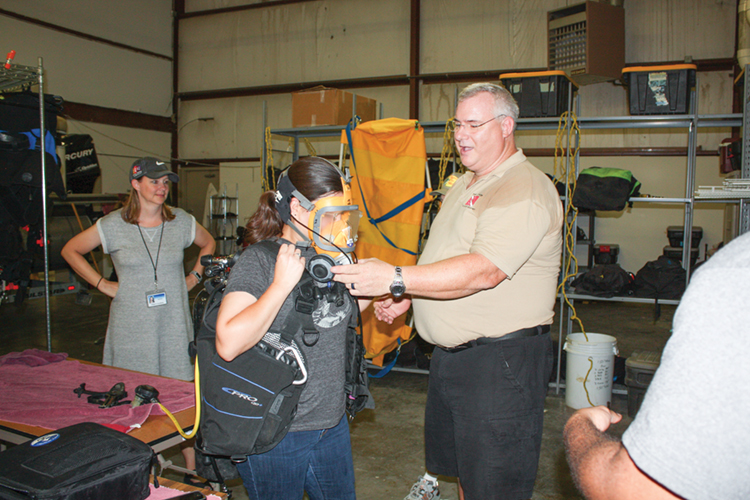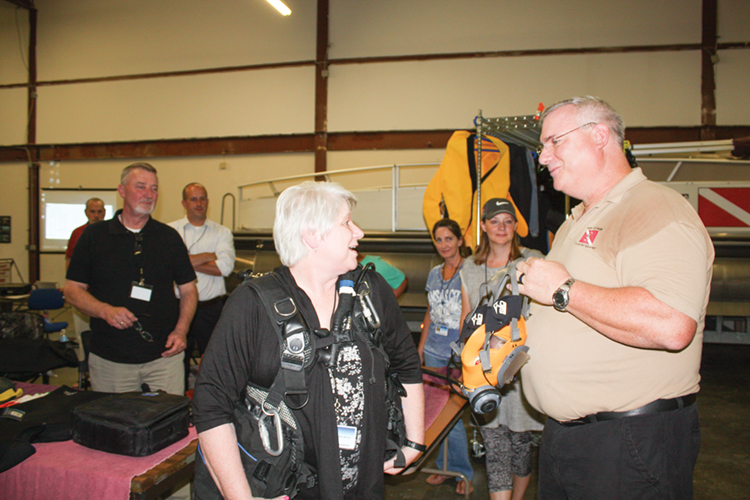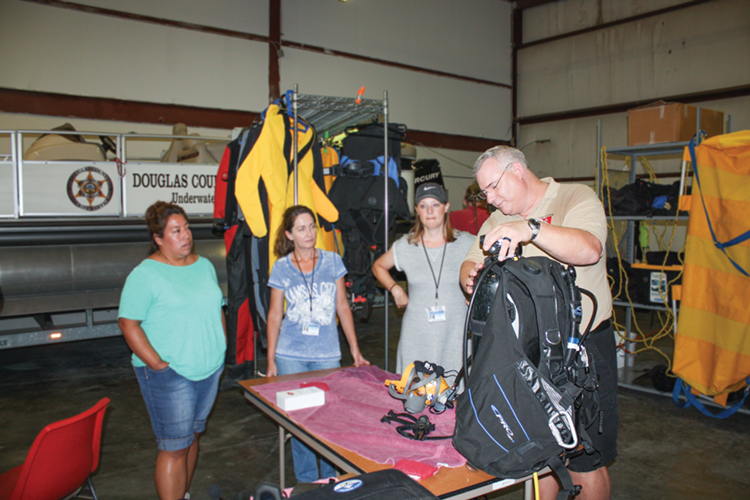The Sheriff’s Department & The Douglas County Jail
| 2015 Q3 | story by EMILY MULLIGAN | photos by STEVEN HERTZOG |

Sheriff Kenneth McGovern
Behind the badges and patrol cars, Sheriff Kenneth McGovern oversees a department of 164 deputies, corrections officers, court security officers, investigators and even IT specialists who serve Douglas County.
McGovern would be the first to say the machinations of the Sheriff’s Office are much more than a uniform or a badge. He is in his third term as sheriff – having been elected in 2004, 2008 and 2012 – and his 34th year working for the Sheriff’s Office.
For reasons both personal and professional, McGovern holds Douglas County communities in high regard and works to ensure that the Sheriff’s Office staff does the same.
“We tell the staff that you should try to make a difference in whatever you do, whether it’s chasing bad guys or anything else, but it’s also how you help people throughout the community,” McGovern says. “We’re part of this community and here to make this a good place to live.”
Paul Taylor is a local pastor and chaplain who works with the Sheriff’s Office staff. He has known McGovern since Taylor was a paramedic and McGovern was a patrol officer.
“He adopts a holistic approach to the improvement of the department,” Taylor says of McGovern. “He believes that if he is taking care of his people and serving his people well, then his people will serve Douglas County best. He is there to serve and not to be served.”
In 1982, McGovern was working for a cabinet company that went out of business. He needed a steady income because he had a family, so he went to work as a corrections officer for Sheriff Rex Johnson, whom he had known for several years. From there, he transitioned to the patrol side of the Sheriff’s Office and rose in the ranks to become a road sergeant, lieutenant, captain and then undersheriff.
“I told myself the day I quit having fun and didn’t like it, I’d quit. That hasn’t happened,” McGovern says.
The Sheriff’s Office has two main administrative areas, each overseen by an undersheriff: the Operations Division and the Corrections Division.
The Operations Division includes 25 patrol officers, who are responsible for patrolling the unincorporated areas of Douglas County. They also serve to augment the municipal police forces of Lawrence, Eudora and Baldwin City, as well as the University of Kansas police, when the need arises. In the summer months, Douglas County Sheriff’s patrol also covers Clinton Lake and Lone Star Lake through contracts with the U.S. Army Corps of Engineers and Douglas County Public Works.
Civil Process is another part of the Operations Division, and its staff serves civil court documents to people, including summons, subpoenas, garnishments, court orders and notices to appear, on behalf of the District Court, Magistrate Court, Probate Court and Juvenile Court.
The Operations Division also provides security for the courts, in the courtrooms and at the Douglas County Courthouse and Law Enforcement Center.
Detectives, drug-enforcement officers, staff that tracks warrants, training officers, IT (information technology) staff and the Douglas County Underwater Search and Recovery Team also are part of the Operations Division.

The Corrections Division is responsible for the Douglas County Correctional Facility and its inmates. Employees include those who supervise inmates, do booking and intake, transport inmates, prepare inmates for reentry to the community and perform other administrative functions.
With all of these different operations of the Sheriff’s Office, McGovern’s lengthy career experience in Douglas County prior to his election has provided him with a base of knowledge that he draws on every day with his staff and local citizens.
“In law enforcement, we wear many hats. You have to know when to put the right hat on and go forward,” he says.

Although he consulted his wife, Beckie, and three children at the time, McGovern says the decision to run for sheriff was not a particularly difficult one.
“I was asking myself, ‘How do I help make a difference? I can help somebody else make that change, or I can use what I have to take it down the road.’ As the old saying goes, you want to leave it better than you found it. Sheriffs Johnson and Trapp did well. I wanted to help make a difference with the Sheriff’s Office,” he says.
McGovern explains he embraces the sheriff’s public role in the community, especially when he is out and about.

Sheriff Department Citizen’s Academy,Dive Team Demonstration
“In town, growing up, I got to know many people and met their parents. It still has a small-town feel, but as sheriff, more people know who you are,” he says. “I don’t mind it, but some people joke, ‘I can’t go anywhere with you, because you are going to stop and talk to 10 people.’ To me, I like that.”
The sheriff has had several major undertakings in his time in office, not the least of which has been technology. Since he took office in 2004, technology has changed so much that “in five minutes, you’re out of date,” McGovern says. He has updated the communications center and outfitted patrol officers with mobile data terminals, in addition to working to keep his staff one step ahead of criminals and their technology.
The Corrections Facility has added new programs, including a reentry program for inmates, working to prepare them to return successfully to the community by addressing many aspects of life.
Collaborating with other local police forces and the Kansas Highway Patrol has been a priority for McGovern, not just in coordinating technology but also in overall communications and establishing processes for helping one another.
He says it has been important to him to focus on staff development and enhancement. He is proud to have so many long-serving staff members.
“They enjoy working here and want to continue to be here,” McGovern says.
Taylor says the Sheriff’s Office employees have a true sense of pride and purpose about their work.
“His employees view their job as not just a job to do but a family. They enjoy the work they do because of the atmosphere,” he says. “The sheriff is the one who has established and maintained the positive atmosphere.”
McGovern says he is proud of his creation of the annual Sheriff’s Office Citizen’s Academy, which meets in August and September every year for seven weekly meetings and two full Saturdays. The idea behind the Citizen’s Academy is to build awareness of what all the Sheriff’s Office does and to give community members an opportunity for hands-on instruction.
Participants in the Citizen’s Academy tour the facilities and learn about car-stop techniques, field sobriety testing, building searches, serving civil papers, running the jail and many other aspects of the Office’s work. They even get to try their hand at takedowns and other physical activities.
“I think they come away with their eyes opened,” McGovern says.
The Douglas County Jail

Douglas County Jail
The Douglas County Correctional Facility opened at its current location in eastern Lawrence in 1999. In 2011, Sheriff McGovern oversaw a renovation and expansion of the jail. The facility expanded from 50 beds to 186 beds and reconfigured from a “linear” setup that had rows of hallways and cells, similar to rooms in a traditional hospital corridor, to a “pod” configuration. Pods are groupings of cells that allow for direct supervision, meaning corrections officers are in the middle of the cell groups so that they can see, hear and be physically proximate to inmates at all times.
The new design is not only more functional and efficient for the staff, but it also allows for more and better resources for the inmates, including its library, which has an active volunteer force. The jail also offers medical cells, addiction-recovery meetings, GED (general education development) preparation, life-skills workshops, employment-skills instruction and religious programs.
“We’ve had numerous agencies come in to look at our design and philosophy. We think it’s a pretty well-run facility, and the staff takes pride in the way it looks and runs,” McGovern says.
Taylor credits McGovern with providing a positive approach that the corrections facility staff emulates.
“There is a commitment to always treat people with dignity and respect while they are incarcerated. The philosophy from top to bottom is that these aren’t law breakers and bad people; they’re real people with real values who can turn right around. And we want to help them make changes,” Taylor says.
Despite 2010 research that it would increase, the average daily population of the jail experienced a decrease after the expansion. In the past couple of years, however, the average daily population has begun an uptick – especially among female inmates, who at times have exceeded the jail’s 28 beds in the female pod.
Besides an increase, in general, in female inmates and offenders in Douglas County, McGovern points to one main contributing factor in having more inmates: mental health.
The Sheriff’s Office and Bert Nash Community Mental Health Center began a partnership in 2013 both to help address and prevent mental-health issues among inmates.
McGovern says that with the closing of state hospitals and other psychiatric hospitals, problems among inmates and offenders became more amplified, and the general conversation about mental health was not as open as it is today. The court systems are also absorbing the impact, he says, and the implications of people not having resources for their mental health affect patrol officers and other aspects of law enforcement daily.
“That’s where we are struggling – how do we help? Where can they go to get treatment? This community is fortunate because we have a mental-health provider willing to work with us, Bert Nash,” he says. “We need to figure out how to help folks when they go in and when they leave to make sure there’s a handoff to someone when they leave the jail.”
Although the pods are helpful for staff to monitor the inmates consistently for mental-health issues, McGovern emphasizes the facility is not designed for treating mental illness, and that presents some challenges.
The Sheriff’s Office and Bert Nash have created ways to help inmates as best they can. The intake process at the jail includes questions to assess inmates’ mental health and responds to those who need assistance accordingly.
There is a full-time therapist at the jail and other Bert Nash therapists and interns who are assigned weekly hours for one-on-one therapy and group therapies for anger management, relapse prevention, behavioral therapy and other topics.
Because of the increase in the average daily population, especially among female inmates, and the prevalence of mental illness, along with other issues, the Douglas County Commission recently began discussing another expansion of the jail. The commission has undertaken a study, and so far it estimates the expansion cost to be between $20 and $30 million.

86 Comments
Really appreciate you sharing this post.Really thank you! Really Great.
I really enjoy the blog post. Fantastic.
Ero Pharm Fast: Ero Pharm Fast – Ero Pharm Fast
Licensed online pharmacy AU: Pharm Au 24 – Discount pharmacy Australia
I really enjoy the blog post.Much thanks again. Awesome.
Thank you ever so for you article.Much thanks again. Great.
get antibiotics quickly: antibiotic without presription – best online doctor for antibiotics
Licensed online pharmacy AU: Discount pharmacy Australia – Pharm Au24
Over the counter antibiotics pills: Biot Pharm – buy antibiotics online
commander Viagra discretement: Viagra sans ordonnance 24h – acheter Viagra sans ordonnance
commander Kamagra en ligne: achat kamagra – achat kamagra
cialis generique: Acheter Cialis 20 mg pas cher – traitement ED discret en ligne
kamagra livraison 24h: kamagra en ligne – Kamagra oral jelly pas cher
I couldn’t resist commenting. Exceptionally effectively created!
You revealed that adequately! Save Decongestant For Use With Azithromycin
Cialis generique sans ordonnance: acheter Cialis sans ordonnance – Cialis sans ordonnance 24h
Hey! Would you mind if I share your blog with my twitter team? There’s a good deal of parents that I do think would really respect your content. Make sure you allow me to know. A lot of many thanks
slots for real money play slots online online gambling
cialis sans ordonnance: Acheter Cialis 20 mg pas cher – Acheter Cialis
pharmacie en ligne sans ordonnance: Achat m̩dicament en ligne fiable Рacheter m̩dicament en ligne sans ordonnance
commander Kamagra en ligne: kamagra livraison 24h – achat kamagra
What’s up colleagues, its enormous post on the topic of educationand completely explained, keep it up allthe time.
pharmacie en ligne sans prescription: acheter medicaments sans ordonnance – pharmacie en ligne
livraison rapide Viagra en France: Viagra sans ordonnance 24h – commander Viagra discretement
Xoilac Tv Thẳng Bóng Đá w88Đội tuyển futsal nước Việt Nam đã được một trận đấu đồng ý được trước đối thủ đầy mức độ mạnh Lebanon. Kết quả Bà Rịa-Vũng Tàu vs Bình Phước ngày hôm nay 18h00 ngày 5/5, Hạng nhất nước ta.
wonderful issues altogether, you just received a new reader.What might you recommend in regards to your publish that you madesome days ago? Any certain?
pharmacie internet fiable France: pharmacie en ligne – pharmacie en ligne livraison europe
Cialis generique sans ordonnance: pharmacie en ligne france livraison internationale – cialis prix
cheers for the actual article i have recently been on the lookout with regard to this kind of advice on the net for sum time right now so many thanksxmr
?????????????? ? ????? ?? ????????????.??? ?????????????? ????????? ? ??????????????.?????????? ??? ??????? ???? ? ?????????????????????Loading…
pharmacie en ligne pas cher: Pharmacies en ligne certifiées – pharmacie en ligne france pas cher
acheter kamagra site fiable: acheter Kamagra sans ordonnance – kamagra oral jelly
Pharmacies en ligne certifiées: pharmacie en ligne france livraison belgique – pharmacie en ligne sans ordonnance
commander sans consultation medicale: pharmacie internet fiable France – trouver un mГ©dicament en pharmacie
Pharmacie sans ordonnance: kamagra livraison 24h – commander Kamagra en ligne
Acheter Cialis 20 mg pas cher: traitement ED discret en ligne – Acheter Cialis 20 mg pas cher
pharmacie en ligne sans prescription: pharmacie en ligne – pharmacie en ligne france pas cher
livraison rapide Viagra en France: Meilleur Viagra sans ordonnance 24h – Viagra sans ordonnance 24h
Cialis pas cher livraison rapide: acheter Cialis sans ordonnance – commander Cialis en ligne sans prescription
A round of applause for your blog article.Much thanks again. Really Great.
Great, thanks for sharing this blog article.Really thank you! Fantastic.
pharmacie en ligne sans prescription: Medicaments en ligne livres en 24h – Pharmacie sans ordonnance
pharmacie en ligne pas cher: pharmacie en ligne pas cher – pharmacie en ligne sans ordonnance
Viagra sans ordonnance 24h: viagra sans ordonnance – commander Viagra discretement
Pharmacie sans ordonnance: cialis prix – cialis sans ordonnance
Pharmacies en ligne certifiees: pharmacie en ligne sans ordonnance – pharmacie en ligne avec ordonnance
traitement ED discret en ligne: cialis generique – traitement ED discret en ligne
Acheter Cialis 20 mg pas cher: cialis generique – Acheter Cialis
I want to to thank you for this great read!! I absolutely enjoyed every little bit of it. I have you saved as a favorite to check out new stuff you postÖ
This was an awesome blog post. I loved it. I’ll return to view more. Thank you .
acheter mГ©dicament en ligne sans ordonnance: acheter kamagra site fiable – kamagra gel
Really appreciate you sharing this blog. Great.
I truly appreciate this article post.Thanks Again. Fantastic.
https://viasansordonnance.com/# Viagra sans ordonnance 24h Amazon
acheter medicaments sans ordonnance: pharmacie en ligne sans prescription – п»їpharmacie en ligne france
Meilleur Viagra sans ordonnance 24h: commander Viagra discretement – viagra sans ordonnance
livraison rapide Viagra en France: Meilleur Viagra sans ordonnance 24h – livraison rapide Viagra en France
acheter kamagra site fiable: kamagra pas cher – acheter kamagra site fiable
achat kamagra: kamagra pas cher – kamagra pas cher
Have you ever heard of second life (sl for short). It is essentially a game where you can do anything you want. SL is literally my second life (pun intended lol). If you want to see more you can see these sl authors and blogs
Hi! Do you use Twitter? I’d like to follow you if that would be ok.I’m definitely enjoying your blog and look forward to new posts.
commander Cialis en ligne sans prescription Cialis generique sans ordonnance Cialis pas cher livraison rapide
Hi my loved one! I wish to say that this article is amazing, great written and include approximately all significant infos. I?¦d like to peer more posts like this .
prednisolone liquid ingredients prednisolone acetate coupon prednisolone side effectsprednisolone tablets for humans feline lymphoma prednisolone prednisolone acetate structure
Kamagra oral jelly pas cher: acheter Kamagra sans ordonnance – livraison discrète Kamagra
acheter Cialis sans ordonnance: traitement ED discret en ligne – commander Cialis en ligne sans prescription
Pharmacies en ligne certifiees: pharmacie internet fiable France – Pharmacie Internationale en ligne
pharmacie en ligne sans prescription: pharmacie internet fiable France – Pharmacie Internationale en ligne
pharmacie internet fiable France: commander sans consultation medicale – pharmacie en ligne livraison europe
http://ciasansordonnance.com/# Pharmacie sans ordonnance
A round of applause for your blog article.Really thank you! Awesome.
A round of applause for your blog article.Much thanks again. Much obliged.
Viagra sans ordonnance 24h: Acheter du Viagra sans ordonnance – Viagra homme sans prescription
pharmacie en ligne sans ordonnance: pharmacie en ligne pas cher – pharmacie en ligne pas cher
Cialis sans ordonnance 24h: pharmacie en ligne pas cher – cialis generique
Acheter Cialis: Cialis generique sans ordonnance – traitement ED discret en ligne
https://pharmsansordonnance.shop/# pharmacie en ligne avec ordonnance
There’s certainly a lot to learn about this subject. I love all the points you made.
Your style is so unique compared to other people I have read stuff from. I appreciate you for posting when you have the opportunity, Guess I’ll just bookmark this blog.
Hey, thanks for the article. Fantastic.
Really appreciate you sharing this blog post.Thanks Again. Cool.
I was just wondering what computer software you would need to make business cards or labels from a home computer. Is is easy or even worth the time or money..
Wow! At last I got a blog from where I be able to truly obtain useful information concerning my study and knowledge.
Pharmacie sans ordonnance: cialis generique – Acheter Cialis
I’m truly enjoying the design and layout of your blog.It’s a very easy on the eyes which makes it much more pleasant for me to come here andvisit more often. 카지노사이트
Hey There. I found your blog using msn. This is a very well written article.I’ll be sure to bookmark it and return to read more of your useful info.Thanks for the post. I will definitely return.